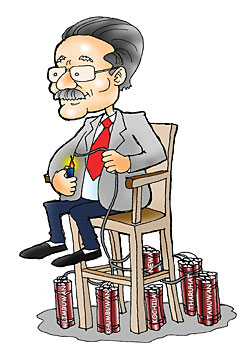 BILASH RAI |
I have always felt ethnic extremism should never lead to the fragmentation of the Nepali nation. Which is why we have always tried to ensure progress towards a proportional representation of ethnicities through elections. The marginalisation of these groups can be redressed peacefully through elections. But the Maoists hijacked this agenda during the war and made the ethnic groups carry guns. Ethnic groups that were moving ahead in a peaceful manner were sidetracked into violence.
The Maoists are being dishonest towards the Janajati movement with their ethnic autonomous councils. It is opening up a can of worms. Already, Bahuns, Dalits and Muslims are saying: where are our autonomous councils?
It looks like the councils will have hereditary chief ministers from only the ethnic group represented. Limbus and Magars are majorities in their areas, but following the Maoists to declare Limbuwan and Magarat shows an insecure minority mindset.
Limbus will not liberate their people by asking for Limbuwan. Magars will not be autonomous in a Magarat. The kind of emancipation we want is one which can bring together all 30 million Nepalis. We don't want a territorial liberation because that would mean explusion of those not belonging to a particular group. The Maoists are lighting an ethnic bush fire that they will not be able to control.
Many say a federal state structure is the first priority for ethnic liberation. For me it is only number two. If federalism is for decentralised development, it may still have some uses, but it is not enough reason to carve up the country along political lines. The most we can do is have representation in the national legislature or federal councils that is proportionate to the ethnic composition of the country.
In a sense, most of us in Nepal came from somewhere else to live here. We shouldn't waste time trying to figure out who settled down where first.
The important thing is for one group not to behave like the others do not exist. By not dividing up opportunities equally, there is a danger that the struggle for liberation will turn violent. We should address societal inequities before they turn violent. There is still time to address the problem of discrimination and inequality in a non-violent manner, we haven't exhausted peaceful options.
The proportional representation in the legislature/constituent assembly last year wasn't a mechanism to allow former prime ministers who lost elections to have a berth in the house. It was to allow the marginalised and unrepresented groups a presence in the legislature. The question of ethnic representation has to be addressed at the political level within the chambers of the house. Lately, however, we see the struggle spilling out into the streets, and it is spinning out of control of the political forces.
I have never lived through an ethno-separatist civil war and I hope to never have to see it dismember my own motherland.
Gorebahadur Khapangi Magar is the acting chairman of the Rastriya Janamukti Party. The original version of this article appeared in Himal Khabarpatrika, 16-30 December.
READ ALSO:
Dealing with Delhi, Editorial - FROM ISSUE #482 (25 DEC 2009 - 31 DEC 2009)



